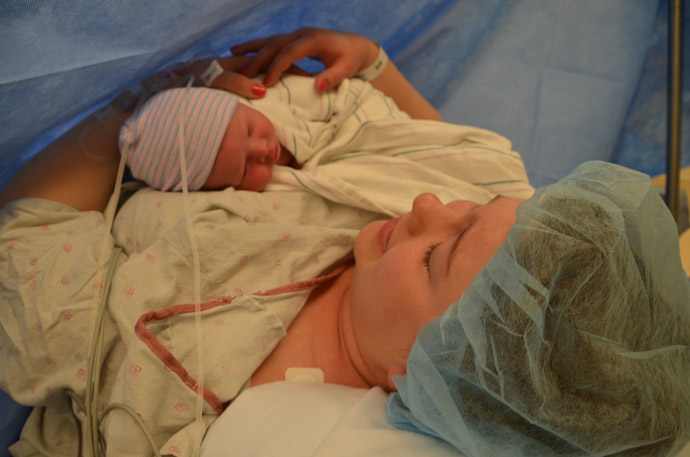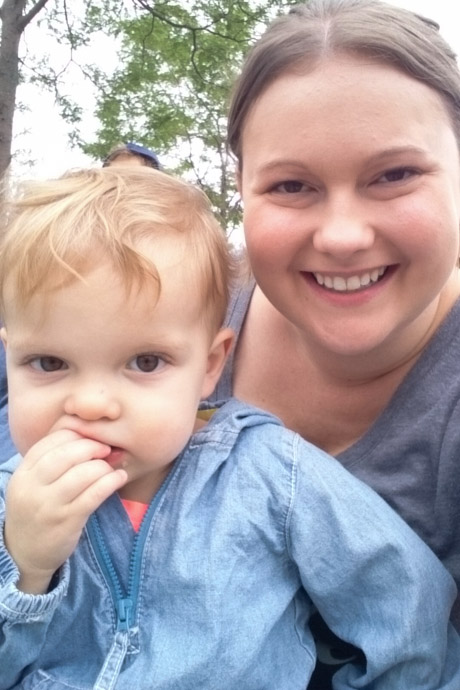It started when we were still in the hospital. I had an extended stay due to health issues and, on my third night, I sent my baby to the nursery at the persuasion of my nurse because I hadn’t slept in over 48 hours. I shut my eyes and an hour later, after trying in vain to fall asleep, I heard it: My baby was crying. I told myself I was probably imagining it, but after 10 minutes passed and the cries continued to ring in my ear, I pressed the call light, summoning the night nurse. She stepped quietly beside my bed and I shielded my eyes against the light.
“Is my baby crying?” I asked.
She gave me a puzzled look, and shook her head, “No … no, she’s perfectly fine. She’s asleep.” With that, the phantom noises stopped, leaving me in a deafening silence.
I felt my breath catch in my throat. It was the first time in my life that I thought I was going crazy. Because I swore I heard her crying.
It didn’t stop once we got home. In fact, those auditory hallucinations stayed with me periodically until my daughter was well over a year old.
It’s easy now, almost two years out from giving birth, to look back on that first year and attribute it all to being a new mom. To being hormonal. To becoming a parent after infertility. At best, I thought maybe I was just really sensitive. At worse, I was being overdramatic and thinking too much.
Those nights I would lay in bed, too paralyzed with fear to even move to check on my sleeping baby beside me in the bassinet, convinced that she was dead. That if I shifted to touch her face, I would be met with coldness.
Those nights spent in the dark, frantically digging through the blankets trying to find her little body, until reason would hit me and I would remember I had put her back in her bassinet after nursing.
Those moments I could do nothing but cry, as I rocked her, thinking through every worse case scenario imaginable that could cause her to be ripped from me.
Those quiet minutes when she would be rocking peacefully in her swing and I could do nothing but clench my fists because I knew she had stopped breathing, and I just couldn’t face going to her.
The panic that rose in my chest at the thought of letting anyone but my husband and me buckle her into her car seat.
I couldn’t leave her with anyone except my parents and sister because the thought of anyone else caring for her made my heart pound. During the first few weeks, when people would hold her, cuddle her close and joke about how they may never give her back to me, it was all I could do to not snatch her back and press her to my chest.
I was screened for depression at every doctor’s visit for the first year postpartum. And every visit, I would dutifully check off the boxes. I scored a big fat zero every single time. And because of that, I never spoke up. I never told my OB, the pediatrician or my family practice provider what was swirling through my head. I most certainly wasn’t depressed. I was just an anxious new mom.
It wasn’t until right before I started seeing my first therapist that I knew that I had been walking around with a raging case of postpartum anxiety for the better part of 18 months.
I wasn’t crazy. I wasn’t just being a new mom. I had postpartum anxiety and no one ever caught it.
Why aren’t new moms screened for anxiety like we are for postpartum depression? Depression is so important to talk about. But so is anxiety.
How much better would I have been able to handle things if I had just spoken up? I would’ve started therapy way back when my daughter was an infant. I’m working through my fears under the care of a counselor now, but I wish I would have been diagnosed sooner.
I wish more mothers weren’t told it’s “just anxiety” or “just a new mom thing.” Postpartum anxiety is very much real—it’s not in your head and it’s not normal.
I’ve been working on treating my anxiety now for a few weeks though therapy, and I think I can feel the tension letting up. I’m even considering trying a medication short term. It’s hard to not beat myself up for not getting help sooner, but for now, I’m trying to just take it one day at a time.
This article originally appeared on mom.me.



I agree, this is something we need to be talking about and screening for. I think the reason we don’t is because this is still a newly discovered condition (not a new one) that we are just starting to understand.
Hence why posts like yours are important. We’re overdue for getting the word out. So thank you, Risa. This post took a lot of courage. And I’m glad the counseling is helping with healing and giving you new tools. So very important.
Author
Thanks girl. Like infertility, it’s humbling to talk about. But we need to. Because we need education on it and to show others they aren’t alone. And there is still such a stigma surrounding it.
I’m so proud of you for working with a therapist to explore some of these issues and the very real trauma that infertility brings. You are brave for taking this step, and for sharing with us. Thank you for helping to bring a voice to the many who are silenced by depression and anxiety, be it before, during or after pregnancy. <3
Author
Thanks so much girl! It’s awkward being vulnerable, because I know it opens up the door for some unkind criticism, but I suppose that just means, we need to keep talking about it and getting past that stigma.
I am all about the awkward if it means being vulnerable!! I need some kind of a term for pre-pregnancy anxiety. It manifests in raging at pregnant people and wanting to school all the Infertiles on pronatalism. How’s that for awkward?? 🙂
Author
Oh my gosh, I have a whole post I’m dedicating to prenatal anxiety after infertility!
It sounds like screening is a definite need. I think anxiety gets overlooked a lot if you are functional with it, and then you suffer needlessly until you realize you’re NOT crazy, you ARE experiencing horrors, and it doesn’t have to be that way. I felt for you throughout this post and could identify (although not the postpartum part). I don’t doubt that infertility causes trauma and feelings of loss of control and worst-case-scenario thoughts that haunt you after no matter the outcome. I agree with Cristy, this is an important and brave post.
Author
YES! I think we can identify depression because we feel so much…less normal. But anxiety is so easily taken on as “Oh I’m just nervous” or “I worry too much.” Thanks for reading, girl.